A teenage boy lives with his beautiful older sister. He fondly spies her in her sexy red dress, getting ready to meet her date. Later, he spies her in the bath, her luscious body under the suds. He spies her in a sexual position with her nasty boyfriend. In fact, he spends his time spying on her, and one day, he simply strips off his clothes and gets in the bath with her, with an eager grin. He loves her, he tells her. Why not make love?
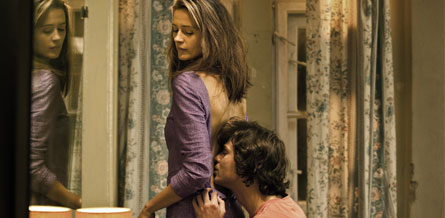
Here is the plot of "Shameless", a new movie by Polish director Filip Marczewski, which just premiered at the Mannheim-Heidelberg International Film Festival. It is a dark movie, not just for its taboo topic, but because almost every character in the movie acts "shamelessly": the electrician who wants to cop a feel from the impoverished sister in exchange for not having her electricity cut; the married boyfriend with two kids who wants his girlfriend, the sister, to have sex with a political crony of his, to bolster his career; the Nazi thugs--in a side-plot--who joyously wreck the marriage ceremony of Roma gypsies.
Indeed, the incestuous brother is the most ethical person in the film. At the end, he and sister eat pistachio ice cream innocently together, with complicit smiles of understanding
Director Filip Marczewski commented: "The brother and sister are together because they think there is no one who cares for them. At least they are there for each other. When we see gypsies on the streets, we think they are dirty, they will steal. We see a brother and sister together in bed: they are bad. We judge them without knowing the people. But these questions are too easy for people to judge. Normal people are not that normal and abnormal ones are not that abnormal. I met a sexologist who said that once a week, he meets an incestuous couple like this."
This movie was just one of the peculiarly engaging films screened at the Mannheim-Heidelberg film festival last week. Dedicated to "undiscovered talent", the festival, now in its sixty-first year, gives an opportunity to young directors from around the world to get noticed. Directors in the past have included such now well-known luminaries as Rainer Werner Fassbinder, Lars von Trier, Atom Egoyan, Jim Jarmusch, and Krzyszof Kieslowski.
The criteria: a film that has not yet made it to the major festivals.
"It's great to be here," confided one new director, the Argentine director Gustavo Fernandez Trivino, as we sat on a couch at one of the festival cocktail parties. He grinned and explained that he had finished film school eighteen years ago, and his entry, "From Tuesday to Tuesday," was his first film.
"You must be very happy," I said.
"I am always happy," he grinned. He was a dedicated martial arts practitioner, a practice evident in his muscled arms and sturdy chest.
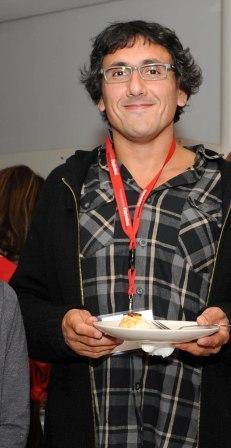
"But what did you do those 18 years after film school?"
"I tried to get a film made, but could not get the money. It took winning a 200,000 euro prize for a screenplay I wrote--this one, in fact--to make my first film."
In the eighteen years, he kept in the movie business by working as a steadycam operator. He pantomimed lugging a heavy camera on his sturdy back. "I loved it. I love being in the business!" Now he is writing his second screenplay.
The Mannheim-Heidelberg festival, founded just seven years after World War II, was the brain-child of Kurt Joachim Fischer, a former Nazi propaganda officer arrested for providing Jews during the war with false identity cards to help them escape. Today the screenings are packed with international industry people and local Germans eager to see these art films from over 29 countries around the world.
Granted, the films are uneven. Some annoyed me, like one self-indulgent film about lost thirty year olds in Australia, with intermittent shots of crawling insects and hapless sex. "Someday I could feel like I could float away and no one would notice," the protagonist complains. Yet others had a fresh original quality, rare in conventional movie fare. Among the noteworthy films: Threes Anna's "Silent City" (Holland), Francesca Lee's "Strawberry Fields" (UK) and Tomas Wasilewski's "In a Bedroom" (Poland).
Threes Anna's "Silent City", based on the director's own novel, was one of my favorites, precisely because its storyline was so weird. A European woman goes to Japan to follow her obsession to learn how to cut fish with a sushi master. The film abounds in sexy close-ups of sliced tuna, eel and bass. The woman draws fish in her journal; she dreams of swallowing fish whole in a restaurant.

It is basically a silent film, because no one speaks to her. Her Japanese colleagues essentially shun her, even when she slices her hand with a knife; her Japanese clients (she has a sideline as a chaste call-girl) uncaringly fondle her; the people in the subway ignore her pleas for directions.
But she persists because she loves the fish so.
The meaning of this silent treatment, this obsession with fish, this eerie unfriendly Tokyo? It is not so clear, although the bubbles she blows at the end do suggest that she has met her ambition to "understand the mystery of fish", something that may have required being sliced (figuratively and sexually) herself.
Wasilewski's "In a Bedroom" had a similarly inchoate story: a woman, for no reason we know, leaves her family so she can drift on the streets and be an online call-girl. Yet she is an unusual call-girl as she drugs her clients before they can sleep with her and spends the night instead washing her hair in the bathtub, or stealing sausages from the fridge. She eventually has a relationship with one of her clients, and their odd conversation becomes the mainstay of the film. Again, silent shots abound, which gives this story about alienation a poetic, if not humorous, edge. As for the meaning of the film: whatever it is that the protagonist discovers in her journey leads to a cryptic smile.
"Strawberry Fields" had a more straightforward plotline. A girl "drops out" to work as a harvest picker with a group of young fruit pickers in sunny bucolic Kent--and all seems quaint until her disturbed sister shows up and creates emotional havoc. The scenes move quickly, the scuffling among the youngsters in their dorm rooms, or on the beach, echoing the lively pace.
Director Francesca Lea, from the UK, explained the motivation for her film with much gusto and verve. "I did not want to talk about mental illness in the film, but the sisters' behavior is quite unstable. Having worked in prisons and mental hospitals, I personally have seen a lot of damaged people, even among friends and family. I wanted to force the audience to be privy to complicated behavior. I wanted Streetcar from Stella's point of view."
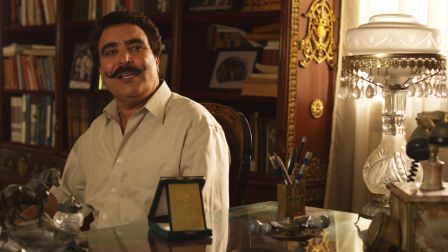
Certainly the most entertaining film in the festival was the Moroccan movie, "Rough Hands", a great success albeit its conservative message. A poor school-teacher wants to leave Morocco for Spain as there is no opportunity for her in her native home, and---the film suggests strongly--Moroccan men have lost the ability to keep their women. All, that is, except for an illiterate neighbor who lives with his blind mother. He, in love with the pretty schoolteacher, ingeniously has her compose a letter for him, asking her to marry himself. It is one of the funniest scenes ever--surprising the audience by making them laugh out loud--only to be outdone by the hilariously scripted celebration which concludes the film.
Yet the movie which won the festival was none of the above. It was Niki Karimi's "Final Whistle" which took the "Newcomer of the Year" prize. An upper class Iranian film director (played by the director herself) takes interest in the plight of a poor woman who, abused by her step-father, became implicated in his murder. The movie works as a suspense thriller as we follow the kind-hearted noble director in her efforts to do good by the woman. The hand-held camera, the sounds of footsteps in the streets, and the passionate conversations in cars (with expressionist red and blue neon lights flitting on the window-shield) not only remind us of compatriot Kiarostami's film style, they give this film an urgent presence. We feel we are there with the characters in Tehran, gripped by their crisis, and the last scene is truly breath-taking.
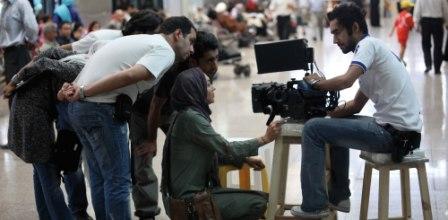
My objection aside that this is too much of a "goody-two-shoes" movie, with the wellmeaning director playing a would-be savior to the poor, the film does work overall and raises provocative issues. As women's abuse, insecurity and disempowerment was astonishingly the topic of many of these festival flicks from around the world, it is also fitting that the jury chose to honor this particular film--which showcases the powerlessness of women, both rich and poor alike--with the festival's main award.
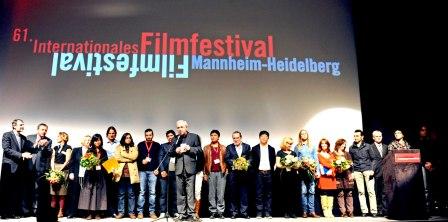
festival photos - Ben Pakalski/www.pakalski.de
